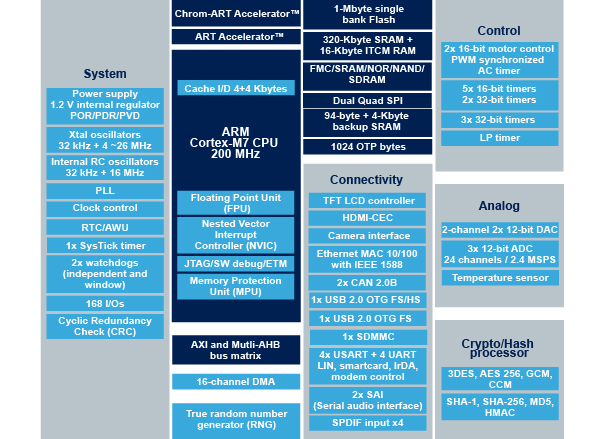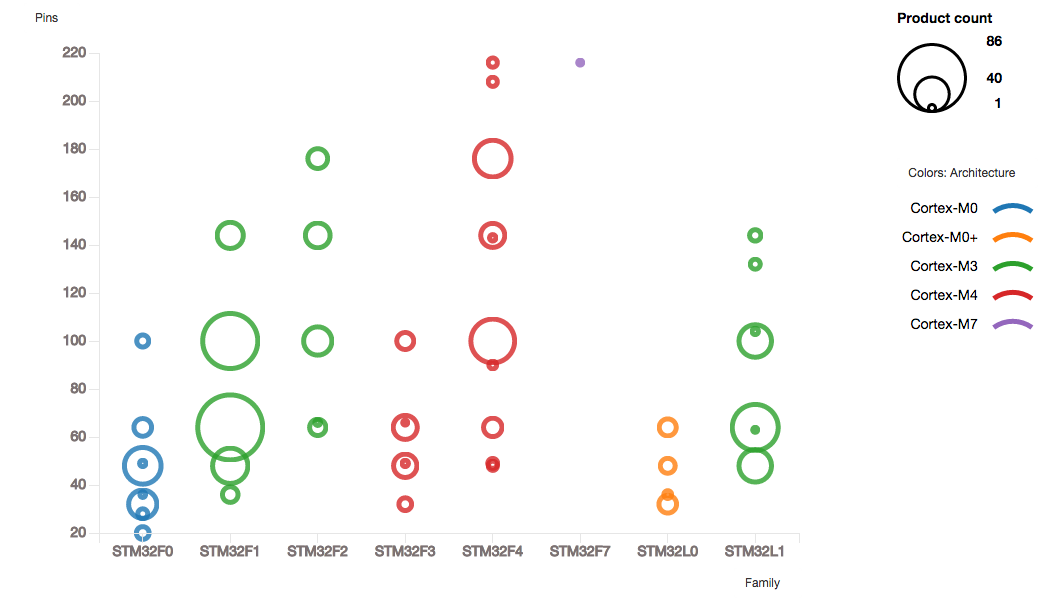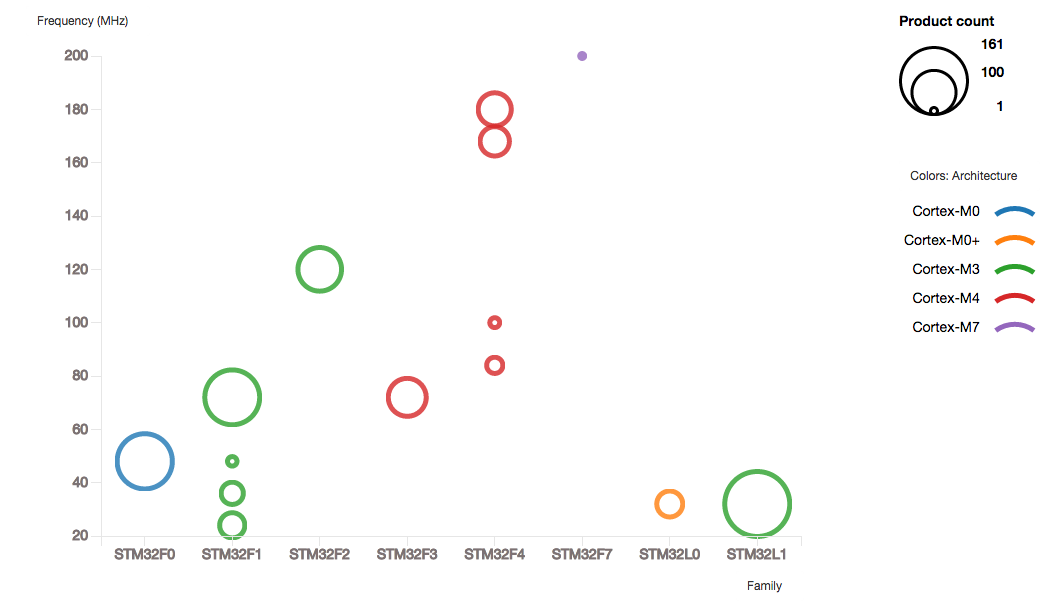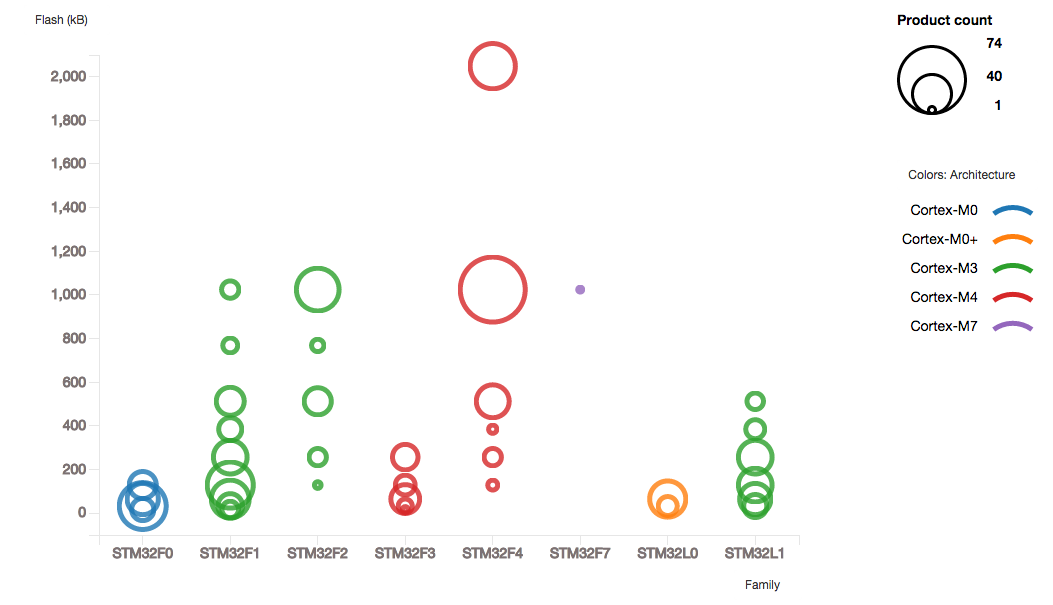October MCU update: Cortex-M7 big bang, ST jumps the gun, who else is in?
16
Oct
2014
ARM made a big splash at their Tech Con earlier this month with the announcement of the Cortex-M7. ARM has rounded up some big names in the MCU market: Atmel, Freescale and ST have all licensed the core, with a few more unannounced ones.
Interestingly, ST has jumped the gun and released the first Cortex-M7 based family, the STM32F7. The first STM32F7 silicon was demonstrated at the ARM Tech Con. Atmel and Freescale are not far behind, and we should see the release of a slew of new Cortex-M7 based products in the coming months
With ARM spilling the Cortex-M7 beans and ST showing silicon at ARM tech con, Atmel has been compelled to accelerate the PR millbefore the planned announcement at Electronica as we wrote last month. The release gave some good insight into the soon-to-be-named family. SAM7 is already taken by legacy ARM7-based products.Interestingly, the new family belongs to the team that owns the application processors based on the Cortex-A. It suggests that the target applications for the Cortex-M7 overlap to a larger degree with the low end of the Cortex-A target markets.
The portfolio will come in 3 flavors: general purpose, connectivity and automotive-qualified.
The overall specs disclosed where aggressive with a frequency of up to 300MHz for the first devices and a generous 384 kB of RAM for 2MB of Flash, stock USB HS OTG and HS PHY, with Ethernet for the connectivity flavor.
Aside, from that big bang, Atmel released 65 new SAMD20 products, most of them being higher temperature versions of existing products and 5 with new UFBGA packages.
Atmel had minor price updates, around +/-2%.
Freescale was also part of the big bang Cortex-M7 annoucement, but kept quiet on their plan for samples and portfolio.
At the same time, they quietly published 37 new products. There was a brand new family, the KLx7 split roughly in half with (KL27) or without (KL17) USB Device FS. The KLx7 family focuses on a 48MHz Cortex-M0+, with 128-256 kB Flash.
In this new release was a unique part: the MK24FN256VDC12. Details are still a bit sketchy but if it holds true, it would be the first Kinetis to have the same amount of RAM and Flash – 256kB. In the Cortex-M world, ST was the only one with such parts, namely a couple of STM32F334 and STM32F105.
Finally, the MKL3 family was beefed up with 5 new devices. These are 48 MHz Cortex-M0+ parts with LCD support and no USB. The KL4 adds USB to the KL3 and welcomed 5 new parts as well.
No price change at FSL.
NXP refreshed its lineup with a new LPC82x family, a 30 MHz Cortex-M0+ with 16 and 32 kB Flash options, one ADC, one comparator, 3 USART and 2 SPIs. It also added a low-end LPC11E35 with 64kB of Flash. These are single 3.3V supply with limited interfaces.NXP did some cleanup on parts that are not described in their datasheeets – thanks. A number of products with F suffixes were removed (Cortex-M0 based), while the mysterious LPC810M021JN8 disapeared too.
On the Cortex-M3 front, the oddball parts we saw last month disappeared. They were labelled LPC18S and were not described in the nomenclature. 2 other parts, the LPC18UK and LPC18UC were in development and taken off as well.
Finally, the Cortex-M4+M0 families were updated with 2 new products, the LPC43S20FBD144 and LPC43S57JET256. Apparently, the S signifies without AES.
NXP had some good activity at the distribution this month with LPC1E67/68 and LPC11U67/68 generally down 20% across the volumes. LPC11C22FBD48/301 was up ~50% for all volumes below 100 units and LPC810M021FN8 up by close to 100% from 1 unit to 5k units.
Renesas continues the ramp up of the RL78 with the creation of the RL78/D1x for the automotive market. This will transition customers from the aging 78K0. For motor control, there are now 6 more products to complete the RL78/G1G family.
The RX relase was stronger with 27 products on the low end – RX111, 32 MHz, 48 or 64 pins, up to 544 kB of Flash and 4 RX63 100MHz 80 pins 544 or 416 kB of Flash.
Renesas experienced no price change.
Still no signs of movement at Silicon Labs, it’s been 16 months now since the acquisition of Energy Micro by Silicon Labs. No price change either…
The big news is the launch of the STM32F7 family based on the newly announced Cortex-M7.
ST demonstrated a working silicon of the family, the STM32F756NGH6 at the ARM Tech Con and got the Best of Show award.
The Cortex-M7 differentiates itself from its predecessors by its higher performance through:
- A six-stage pipeline
- Tightly-coupled memories
- A 64-bit AXI AMBA4 interface with I-cache and D-cache
Other differences are highlighted below (source: ARM):

The STM32F7 is the top of the line ST MCU and boasts all the high end interfaces, including
- 2 USB ports with 1 OTG FS and one OTG HS
- 1 Ethernet port
- 1 TFT LCD port
- 1 HDMI port
- 2 CAN
The list of all the building blocks is pretty impressive – see below, source STMicroelectronics.

When looking at the STM32 portfolio if STM wants to keep pin compatibility with the STM32F4, we will naturally see parts at 100, 144 and 176 pins – the larger red rings above STM32F4. The initial part is likely compatible with the other 7 parts at 216 pins.

On the frequency front, with Atmel at 300MHz, and ARM claiming 400MHz @40nm, we should expect higher frequencies, and there is room since the Cortex-M4 based ST parts are now maxed out at 180MHz.

Finally, higher processing and more interfaces will call for more code and data i.e. more Flash. Unless STM takes the route used by NXP with high frequency flashless devices interfacing through quad SPI to external Flash. The initial devices embed a dual quad SPI, see block diagram above, certainly adding flexibility to the design.

Oh, and there were 13 other new parts, but like last month, most of them are either TR (tape and reel) or industrial temp (-40 +105C) of existing parts.
Little price changes at ST.
TI released 4 new Tiva parts, mainly package variations of existing parts. On the MSP430 front, we found 30 new parts
- MSP430FR: 6 new parts, FRAM series
- MSP430I20: 24 new parts,for metering and industrial applications
| Sign up for our newsletter |